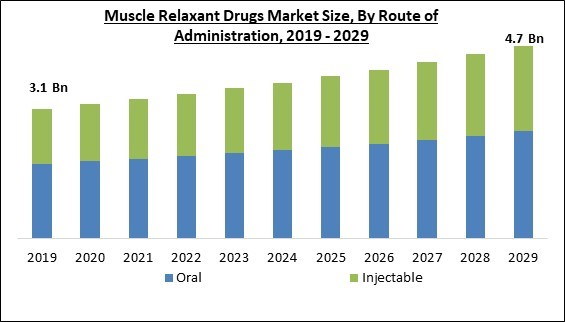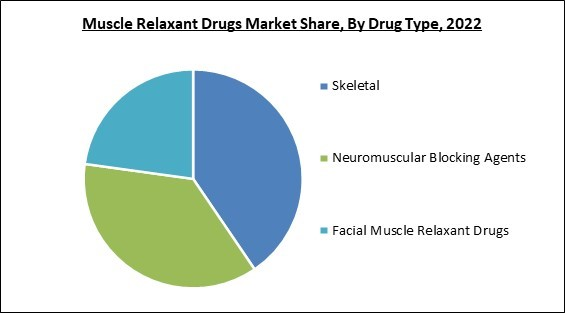Neuromuscular Blocking Agents are significantly capturing the market because of the increasing prevalence of skin diseases and damaging effects of ultraviolet radiation, the rising disposable income leading to increased expenditures on facial aesthetics therapy, and the rising use of neuromuscular blocking agents in surgical procedures. Thus, Neuromuscular Blocking Agents is expected to generate more than 37% share by 2029. More than 882 million individuals in 44 countries remain at risk for lymphatic filariasis in 2021, and preventative treatment is needed to halt the development of this parasitic ailment. 51 million individuals were sick as of 2018 - a 74% decrease since the Global Programme to Eliminate Lymphatic Filariasis of the WHO began in 2000. Some of the factors impacting the market are the increase in Musculoskeletal Conditions, the increasing number of senior citizens, and adverse muscle relaxant side effects.
The most prevalent type of non-cancer pain is discomfort felt in musculoskeletal structures. According to the WHO, 1.71 billion people globally have musculoskeletal disorders, including rheumatoid arthritis, osteoarthritis, amputation, low back pain, neck discomfort, fractures, and other injuries. According to WHO, by 2030, one in six people will be 60 or elderly. There will be 1.4 billion individuals over 60, up from 1 billion in 2020. By 2050, the global population of individuals aged 60 and elderly will have doubled to 2.1 billion. In addition, the number of individuals aged 80 or older is projected to triple between 2020 and 2050, reaching 426 million. Due to the high need for demyelinating disease treatments among this population, the market has considerable growth potential.
However, patients with a history of liver disease, seizures, and other medical conditions or issues are at an increased risk for adverse effects. In addition, pregnant women who intend to become pregnant or are breastfeeding require special attention. As total body relaxants, muscle relaxants typically induce drowsiness or grogginess. As a result, it is unsafe to operate a vehicle or make vital decisions while under the influence of muscle relaxants.
Drug Type Outlook
Based on drug type, the market is segmented into skeletal, facial muscle relaxant drugs and neuromuscular blocking agents. The skeletal segment dominated the market with maximum revenue share in 2022. This is because skeletal muscle relaxants were initially approved to treat muscle spasms and back pain temporarily. Now, they are commonly used to treat chronic pain as well as a variety of other conditions. In addition, people seek medical assistance for a variety of reasons, but the most common one is pain. Thus, their use for the treatment of chronic pain and muscle spasms is expected to propel the segment's growth.Route of Administration Outlook
On the basis of route of administration, the market is divided into oral and injectable. The injectable segment procured a substantial revenue share in the market in 2022. This is due to the fact that the most important companies in the market are working on the creation of innovative new items. Before undergoing general anesthesia, this muscle relaxant is given to the patient. Also, one of the most well-known applications of muscle relaxant injections in anti-aging medication is to reduce the appearance of wrinkles and lines on the forehead and the eyelids, which aids in the segment's growth.Distribution Channel Outlook
By distribution channel, the market is classified into hospital pharmacy, retail pharmacy and online pharmacy. The hospital pharmacy segment witnessed the largest revenue share in the market in 2022. This is owing to the expanding awareness and an increase in clinical and hospital visits. In addition, the increasing geriatric population is a significant factor propelling the segment's expansion. This is due to the fact that the elderly are frequently hospitalized for a variety of chronic disorders for which they receive such medications. Thus, the segment is expected to propel due to the growing hospital admissions and the rising geriatric population.Regional Outlook
Region-wise, the market is analyzed across North America, Europe, Asia Pacific, and LAMEA. The North America region registered the highest revenue share in the market in 2022. The growth is attributed to increased government investment, a rise in the incidence of chronic diseases, and the region's high-quality infrastructure. Due to the increasing number of surgical procedures and high disposable income, the market is expected to grow. Also, the presence of a large elderly population in this region contributes to the high prevalence of chronic back pain and further surge the market growth in the region.The market research report covers the analysis of key stake holders of the market. Key companies profiled in the report include Amneal Pharmaceuticals, Inc., Ipsen Pharma Biotech SAS, Merz Pharma GmbH & Co. KGaA, Mallinckrodt PLC, Teva Pharmaceuticals Industries Ltd., Eisai Co., Ltd., Endo International PLC, Vertical Pharmaceuticals, LLC, SteriMax Inc., and Metacel Pharmaceuticals, LLC.
Scope of the Study
By Drug Type
- Skeletal
- Neuromuscular Blocking Agents
- Facial Muscle Relaxant Drugs
By Route of Administration
- Oral
- Injectable
By Distribution Channel
- Hospital Pharmacy
- Retail Pharmacy
- Online Pharmacies
By Geography
- North America
- US
- Canada
- Mexico
- Rest of North America
- Europe
- Germany
- UK
- France
- Russia
- Spain
- Italy
- Rest of Europe
- Asia Pacific
- China
- Japan
- India
- South Korea
- Singapore
- Malaysia
- Rest of Asia Pacific
- LAMEA
- Brazil
- Argentina
- UAE
- Saudi Arabia
- South Africa
- Nigeria
- Rest of LAMEA
Key Market Players
List of Companies Profiled in the Report:
- Amneal Pharmaceuticals, Inc.
- Ipsen Pharma Biotech SAS
- Merz Pharma GmbH & Co. KGaA
- Mallinckrodt PLC
- Teva Pharmaceuticals Industries Ltd.
- Eisai Co., Ltd.
- Endo International PLC
- Vertical Pharmaceuticals, LLC
- SteriMax Inc.
- Metacel Pharmaceuticals, LLC
Unique Offerings
- Exhaustive coverage
- The highest number of Market tables and figures
- Subscription-based model available
- Guaranteed best price
- Assured post sales research support with 10% customization free
Table of Contents
Companies Mentioned
- Amneal Pharmaceuticals, Inc.
- Ipsen Pharma Biotech SAS
- Merz Pharma GmbH & Co. KGaA
- Mallinckrodt PLC
- Teva Pharmaceuticals Industries Ltd.
- Eisai Co., Ltd.
- Endo International PLC
- Vertical Pharmaceuticals, LLC
- SteriMax Inc.
- Metacel Pharmaceuticals, LLC










